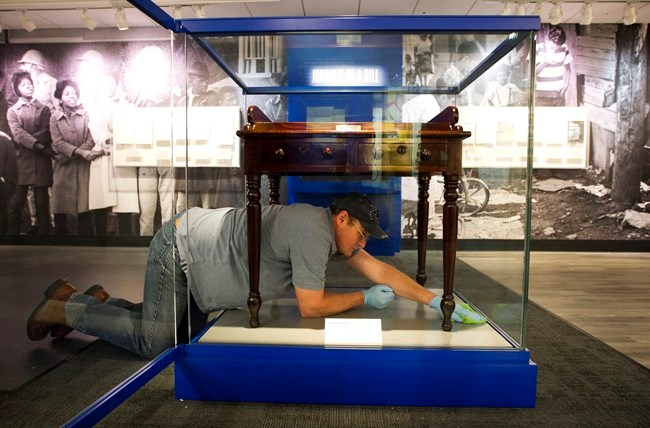AUSTIN, Texas - The United States is fighting a messy war alongside an unreliable ally in Asia, residents are deeply divided between conservatives and liberals, a new health care law just took effect and the nation is struggling with racial and ethnic divisions.
What's happening in the United States in 2012 could just as easily describe the nation in the 1960s: President Lyndon Baines Johnson escalating the war in Vietnam, defeating conservative Republican nominee Barry Goldwater, passing Medicare and pushing through landmark civil rights legislation.
An insider's look at how the Texan dealt with those challenges is on display at the newly remodeled LBJ Presidential Library in Austin, where the old 1970s-style exhibits now use 21st century technology to put visitors in Johnson's shoes. Mark Updegrove, the library's director, said the reopening comes as historians take a fresh look at Johnson's efforts to fight poverty and improve the health of the nation by creating a Great Society.
"The election of 2012 was a referendum on the Great Society programs put into place by President Johnson," he said. "If you look at what is happening in America today, the Great Society is so evident, in the Supreme Court taking a look at voting rights or racial quotas, and the Congress debating cuts to Medicare or PBS."
The new permanent exhibit takes advantage of the presidential archives, which includes 643 hours of recorded phone conversations between LBJ and dozens of people. At one station, a display resembling an old telephone booth plays key conversations about civil rights with Martin Luther King Jr., FBI Director J. Edgar Hoover and others. After a yearlong renovation, the library reopens Saturday in honour of first lady Lady Bird Johnson's 100th birthday.
The library also has a Vietnam "situation room" where an interactive display provides formerly secret documents and recordings of conversations with advisers such as Secretary of Defence Robert McNamara. The display lets the visitor decide what they would do and then shows whether LBJ agreed. The computer screen then displays the consequences, with short videos of presidential historians explaining the significance of the decision.
LBJ's biggest accomplishments, though, are the Great Society programs that extended life expectancies, reduced poverty and banned discrimination. An exhibit shows how he used his years of experience in Congress to push through some of the most iconic laws in the nation's history, including Medicare.
"Every social issue we're dealing with now, Johnson tried to tackle it," said historian Douglas Brinkley of Rice University in Houston. He added that "the season is right for a revisionist look" at Johnson, with a focus on his domestic achievements.
Updegrove, who this year authored "Indomitable Will: LBJ in the Presidency," said that when LBJ took over after President John F. Kennedy's assassination, the U.S. poverty rate was at about 20 per cent. It plunged to 12 per cent, by the time he left office. Poverty in the United States hit an all-time low of 11 per cent just after LBJ left office, then went up to 15 per cent under President Ronald Reagan, where it remains today.
Medicare was the Affordable Care Act of its time, providing federally administered health care to all people 65-years-old or older. Reagan, a young conservative at the time, called Medicare a socialized medicine scheme that would bring an end to freedom in America. More than 45 years later, the program is one of the most popular in the nation.
That year Congress also passed Medicaid, the joint state-federal health care program for the poor. President Barack Obama tried to expand Medicaid coverage through his health care overhaul, but a dozen Republican governors around the country have refused.
LBJ also passed major civil rights legislation that guaranteed people of all races the right to vote, access to public services and to equal opportunity. Yet LBJ's decision to expand the war in Vietnam remains his foremost legacy, something Updegrove believes is changing.
"We haven't properly honoured Johnson's herculean domestic achievements," said Brinkley, the historian from Rice University. "It got overshadowed by the Vietnam War. Half a century later we can see that a lot of what Johnson did has stuck."
For now, though, Democrats rarely invoke LBJ's name, and Republicans use the phrase "Great Society" to ridicule social justice proposals. But Updegrove said politicians of all stripes could learn a lot from how Johnson forged consensus.
"The conversations are a primer in how to get things done in Washington," he said. "If you listen to those conversations you can hear how remarkably effective LBJ was at getting things done and they serve as an example of Washington can do."
___
Associated Press writer Jamie Stengle in Dallas contributed to this report.


